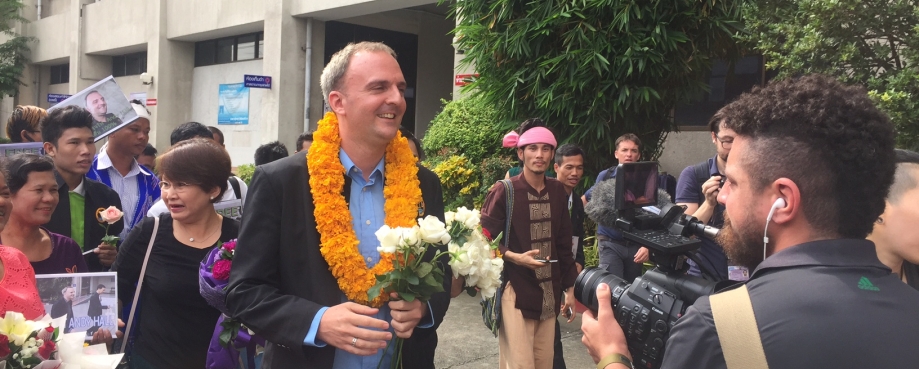
Thailand’s Prakanong Court in Bangkok has just ordered business and human rights advocate, Andy Hall, to pay 10 million baht (£225,957) in civil damages plus legal and court fees to pineapple company Natural Fruit Co Ltd. Nick Kightley, our food and farming lead, reflects on the implications of this verdict.
Two years ago, I expressed ETI’s serious concerns when labour rights advocate Andy Hall was found guilty of defamation for researching and speaking out on migrant worker’s rights in the Thai fruit industry.
Following this latest 26 March court verdict, I must sadly reiterate those concerns.
This latest court ruling has grave implications for free speech and poses a potential threat to workers, future whistle blowers, and business and human rights advocates.
Let’s be clear, Andy Hall was there to research migrant worker abuse.
Let’s also be clear that while we condemn local company lawsuits against legitimate human rights defenders such as Andy Hall, this case is not just about the implications for one person, or even for future activists.
This is also about the potential damage to ‘Brand Thailand’.
We believe that such decisions damage the reputation of Thailand’s food industry as a whole.
Risking the Thai food industry
I recognise that Thailand has been working for some time now to address poor practices, particularly in its fishing fleet and seafood processing plants, and more recently in the agriculture sector more generally.
I’ve personally seen some of the progress being made.
We have strongly supported the steps being taken, albeit slowly, by progressive local companies and the Thai government to reform the system, and increasingly this has included working with civil society groups and local trade unions.
So, importantly, has the ILO – along with large international retailers that source from Thailand, including ETI company members – with their support for initiatives such as the Seafood Taskforce and the ILO ‘Ship-to-Shore and Good Labour Practices Programme’. We are encouraging our members to take an active interest in these issues and to engage in a variety of ways both individually and collaboratively where possible.
Consequently, this court decision is a business risk. Not only for Thailand, but for international companies too.
It demonstrates three urgent necessities:
- The need for better grievance mechanisms - and the commitment to use them - at company level.
- The need for better dispute resolution mechanisms - and the commitment to use them - at industry association level.
- The need for a responsible national regulator to resolve future disputes if companies and associations fail.
It also demonstrates the need for the Thai government to consult with third parties and the industry in order to provide legitimacy and protection under the law to independent observers and advocacy groups.
In the meantime, ETI will continue to engage, seek solutions and, where we can, leverage corporate influence.
However, it is fair to say that this court decision makes maintaining faith in progress less easy.
